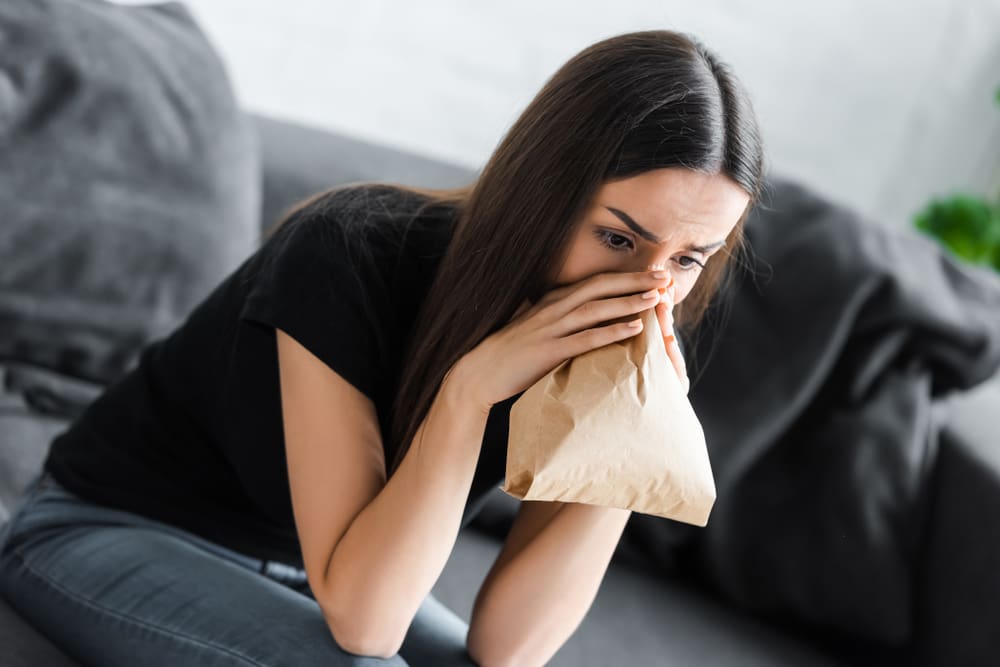Panic attacks, usually caused by exposure to an unusually stressful situation, can happen due to hidden anxiety and may lead to depression. A panic attack is an episode of intense fear that causes strong physical symptoms, despite an absence of any real danger. When panic attacks affect someone frequently, it is known as a panic disorder. This mental health condition is an anxiety disorder that can severely affect your quality of life.
According to the US National Institute of Mental Health, about 2.7% of US adults, or 8.9 million people, had a panic disorder diagnosis in 2018. While the condition was more common among women than men, about 45% of those affected were seriously impaired by it. Even worse, only about half of people with a panic disorder received treatment.
In this article, we’ll cover both panic attacks and panic disorders, including their symptoms, causes, and treatment.
Panic attacks often happen suddenly and without warning. Because of this, many people have an intense fear of an attack unexpectedly occurring and may avoid situations where they might happen, such as flying. Additionally, they may affect your work and social life. For example, they may interfere with your work schedule, cause you to miss school, or keep you away from social outings, like going to the movies or a concert.
Some symptoms of panic attacks mirror the body’s so-called “fight or flight” reaction to real threats. These reactions prepare you to either run away from danger or stand and fight it. When your body confronts a fight or flight scenario, two chemicals, called epinephrine (adrenalin) and cortisol are released from your adrenal gland.
Panic attacks trigger symptoms including:
If these anxiety attacks happen frequently, then you may have a panic disorder.

As of right now, the exact reason why some people have panic attacks is unknown. However, a few factors are thought to contribute to the onset of panic attacks. These include:
Of course, not everyone who suffers from panic attacks has a panic disorder. According to the Diagnostic and Statistical Manual of Mental Disorders (DSM-5), the criteria for diagnosing panic disorders include:
When you see a primary care physician, they will write down your medical history, give you a physical examination and run lab tests. This ensures that the attacks aren’t due to side-effects of medication or another medical condition, such as an overactive thyroid gland.
When panic attacks reduce your quality of life, you should start thinking about finding treatment. Untreated panic attacks can often lead to panic disorders. Moreover, even if your panic attacks aren’t severe enough to warrant a panic disorder diagnosis, you may still benefit from treatment.
Some ways that you can try to stop a panic attack include:
If you suffer from a panic disorder, you may benefit from seeking out a mental health professional. They can help you by incorporating psychotherapy, including cognitive behavioral therapy (CBT) and/or medication, into your treatment plan.


CBT uses techniques such as desensitization and exposure therapy in a controlled setting to gradually and repeatedly bring you into contact with situations that trigger your attack. Over time, the fear that comes with encountering your trigger begins to lessen, and the number of attacks will decrease.
Successful treatment usually requires time, patience, and persistence, but the ability to live without panic attacks is worth the effort. Consequently, your involvement during therapy is very important. A recent study of CBT for the treatment of panic disorder in veterans showed that reductions in attacks were related to overall improved knowledge about the disorder, but resistance to the treatment lessened the effectiveness.
Several types of medications are useful for the treatment of this condition. These include:
All of these medications have side effects, so finding the right medication for you may require trial and error.
Other treatments for treating panic attacks and panic disorders include:
Port St. Lucie Hospital specializes in mental health services and is located on 20 acres near the beautiful Savannas Preserve. If you or one of your loved ones struggles with a mental health disorder, we are here to help.
Our 24-hour mental health services are provided by licensed professionals in various disciplines. We tailor our programs to our patient’s needs and will help you every step of the way.
We welcome you to our facility. From support groups to individual therapy treatment options, we are here to fight the battle with you. Reach out to us online today and take our free mental health screening. You can also call us at (772) 238-7734 to begin your journey toward recovery.














































